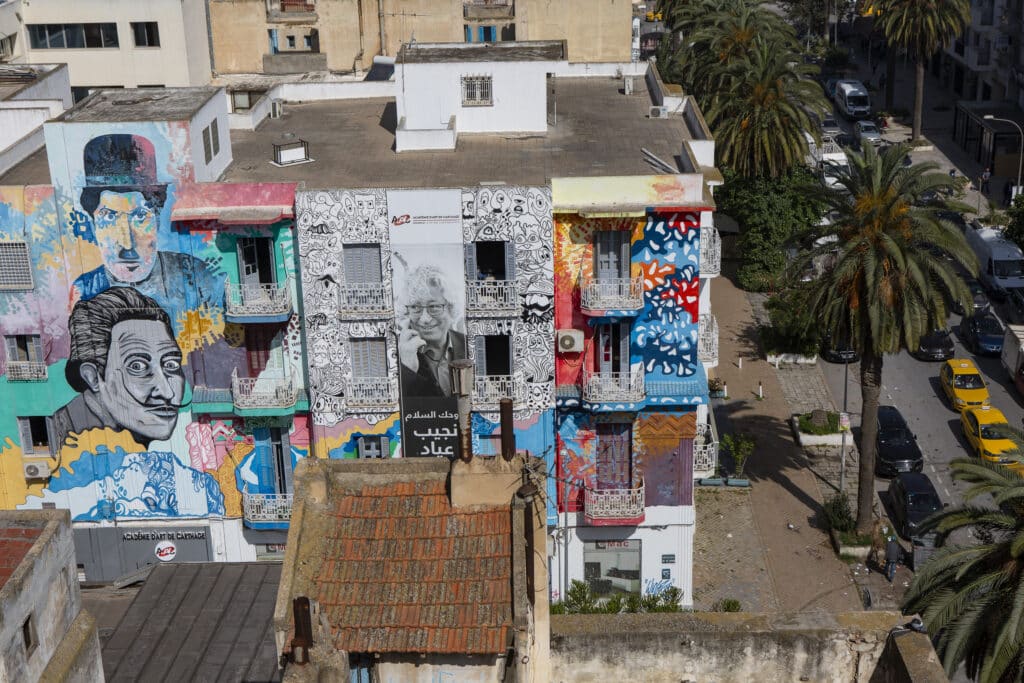
ExPEERience Talk ‘Authoritarian drift in Tunisia: diagnosis and power mapping’ (Webinar)
???? Thursday 30 March: 12pm (Tunisia) / 1pm (Brussels) / 2pm (Kampala)
???? Language: French
???? Download the last report “365 days after article 80”, published by the Alliance Sécurité et Liberté
Tunisia: From a state of exception to a populist and authoritarian turn
Tunisia was considered the democratic exception in the region after the Arab revolutions of 2011 until the activation of article 80 by President Saied on 25 July 2021. That day, the country entered a state of exception (suspension of parliament, dismissal of the head of government and the President’s takeover of the executive and legislative branches) and it generated a rule of law crisis that now threatens to put an end to Tunisia’s democratic transition process.
This authoritarian turn, the end of the separation of powers, ratified by the new Constitution voted one year later (July 2022) by less than a third of the electorate, has been accompanied by increasing and major attacks on the rule of law and on rights and freedoms. The arbitrary dismissal of judges, the press and media being increasingly hindered, opponents, lawyers, trade unionists and journalists being prosecuted and arrested. Civic space is shrinking every day and civil society organisations seem to be the next target. The independent institutions created by the 2014 Constitution, such as the Supreme Council of the Magistracy (CSM), the Constitutional Review Body for draft legislation (IPCCPL) and the Anti-Corruption Commission (INLUCC) have also been meticulously dismantled. The ISIE, the body in charge of elections, which is now subservient to the government, organised legislative elections in December and January to which the overwhelming majority of Tunisians (89%) refused to participate. Finally, the rise in xenophobia, fuelled by the President’s racist and conspiratorial remarks in February 2023, has generated an unprecedented wave of violence against black people, mainly sub-Saharan migrants.
Furthermore, an economic and social crisis continues to worsen, generating impoverishment and the departure, at the risk of their lives, of many Tunisians and migrants from the coast. The country is also still struggling to reach an agreement with the International Monetary Fund (IMF) and the prospect of default is getting dangerously close.
« 500 days after article 80 » : The monitoring of the Alliance Sécurité et Libertés
Since 25 July 2021, ASF and the members of the Alliance Sécurité et Libertés have been monitoring the consequences of President Kais Saied’s actions on the situation of the rule of law and freedoms in Tunisia. Through a qualitative and quantitative analysis, four periodic bulletins have already been published 50, 100, 200 and 365 days after 25 July 2021. The next bulletin to be published, which will cover developments since the vote on the new Constitution unilaterally drafted by President Saied, will offer an analysis of the serious deterioration of the country’s situation in recent months.
The analysis of the political and institutional landscape (I) will focus on the new distribution of powers under the 2022 Constitution, the massive abstention in the last year’s elections following electoral processes that flouted all standards of free elections and the emergence of new institutions of dubious legitimacy and independence, as well as on the situation of the judiciary and the socio-economic crisis the country is going through.
Rights and Freedoms (II) will address the instrumentalisation of justice against opponents of the regime, the repression of the press and media and of trade union work, as well as the migration situation in Tunisia and the massive violence suffered by black people in the country.
Finally, the positioning (III) will analyse the recompositions of the Tunisian political scene and their positions regarding the President’s “roadmap”. It will also analyse foreign reactions to the regime’s excesses as well as Tunisia’s diplomatic policy, in particular its efforts at rapprochement with the Arab states and Italy.
ExPEERience Talk
How did it come to this? What is the state of resistance to these abuses? What are the prospects for the future?
In order to provide answers to these questions and provide an analysis of the authoritarian turn in Tunisia, we will welcome Lamine Benghazi (programme coordinator for ASF in Tunisia) and Mahdi Elleuch (coordinator of the research department for Legal Agenda in Tunis) on Thursday 30 March for our 8th ExPEERience Talk. Entitled “Authoritarian drift in Tunisia: diagnosis and power mapping“, this Talk will take the form of a dialogue between our two guests, followed by an exchange with the participants, concerning the current situation in Tunisia, its stakes and its consequences, based on the analysis carried out within the framework of the report “500 days after article 80” which will be published soon.
You can register now at the following link.
The Alliance Sécurité et Libertés
The Alliance Sécurité et Libertés (ASL) is an alliance of Tunisian and international civil society organisations based in Tunisia which, in the continuity of the Revolution of Freedom and Dignity, reflects, mobilises and acts so that Tunisia consolidates the construction of a democratic state whose public policies are at the service of the citizens guaranteeing peace, respect for their human rights and equality between all.

Reports
Find all the reports of the Alliance Sécurité et Libertés. The report ‘500 days after Article 80’ is currently being written and will be available soon.
365 days after article 80
200 days after article 80
100 days after article 80
50 days after article 80



